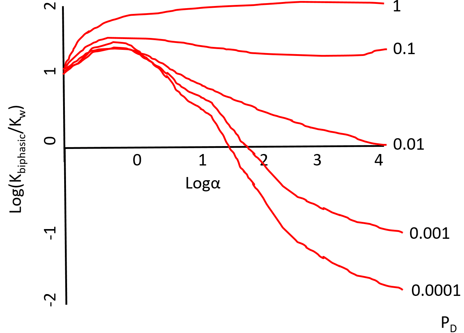Question

a.
Variation in the apparent equilibrium constants of a one-substrate one-product reaction
b.
Variation in the apparent equilibrium constants of a two-substrate two-product reaction
c.
pH dependence on apparent equilibrium constant
d.
Effect of the polarity of A and B
Posted under Enzyme Technology
Interact with the Community - Share Your Thoughts
Uncertain About the Answer? Seek Clarification Here.
Understand the Explanation? Include it Here.
Q. What does the diagram depict?
Similar Questions
Explore Relevant Multiple Choice Questions (MCQs)
Q. What is represented in the following plot?
View solution
Q. What does the following graph represents?
View solution
Q. What does Pᴀ represent in the following reaction?
View solution
Q. In the below reaction, Kw is represented by ___________
View solution
Q. What is represented in the following diagram?
View solution
Q. What is represented in the following diagram?
View solution
Q. What does the following diagram represent?
View solution
Q. What does ‘X’ represent in the following reaction?
Ethyl acetate + isoamylalchohol \(\underset{Lipase}{\rightleftharpoons}\) X + ethanol
View solution
Q. Cocoa butter is a fat which is not used in confectionery.
View solution
Q. For which of the following, acidolysis reaction is not required?
View solution
Q. Cocoa butter may be produced by using ________ acting as transacylases.
View solution
Q. Alcoholyses allows the exchange of alcohol between esters and alcohols by use of _________ enzyme.
View solution
Q. _______________ is a reaction which involve carboxyl group exchange between esters and carboxylic acids by use of transferases.
View solution
Q. The reactions which involve carboxyl group exchange between esters with the help of transferases is referred to as ___________
View solution
Q. ___________ synthesizes N-acetyllactosamine using a carbon-celite column to remove it, as soon as it is formed.
View solution
Q. _____________is used to produce dextran from sucrose.
View solution
Q. ____________ is a low cariogenic sweetener, which consists of a mixture of glucose, sucrose and β-2,1 linked fructans with terminal non-reducing glucose residues.
View solution
Q. Which of the following compounds are synthesized by fructosyltransferases?
View solution
Q. Which of the following enzyme is not used to construct oligosaccharides?
View solution
Q. Use of glycosidases in synthetic reactions is a comparatively neglected topic.
View solution
Recommended Subjects
Are you eager to expand your knowledge beyond Enzyme Technology? We've handpicked a range of related categories that you might find intriguing.
Click on the categories below to discover a wealth of MCQs and enrich your understanding of various subjects. Happy exploring!








